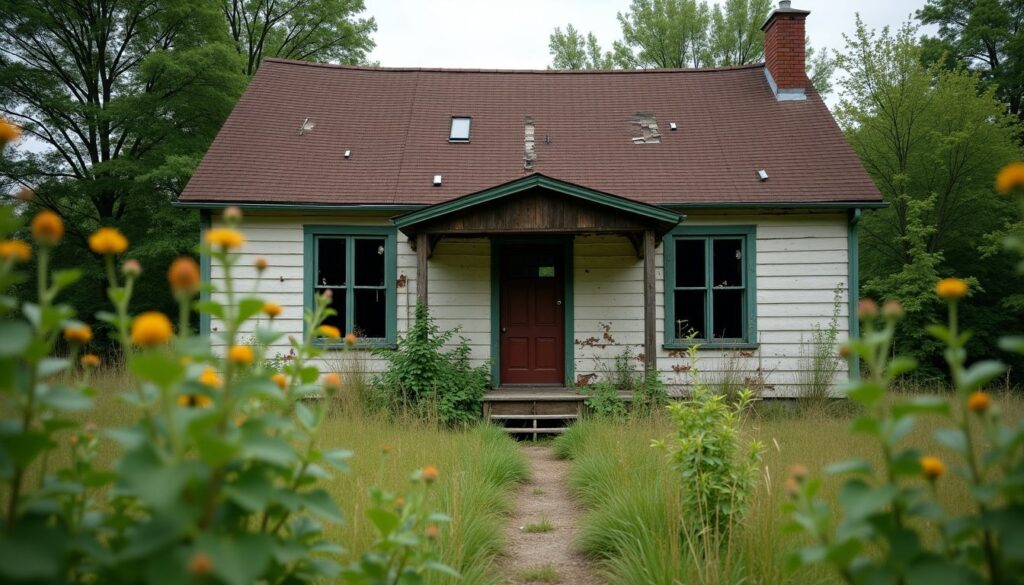Last updated on December 27th, 2025 at 08:06 am
Stuck with a house that’s been condemned or has serious safety issues? You’re not alone, and you do have options. This guide will show you practical ways to turn that problem property into cash, even when it seems impossible to sell.
What Makes a House “Condemned”?
Condemned houses are properties that are deemed unfit for human habitation due to safety or health concerns. They can be condemned because of various reasons such as structural damage, code violations, or hazardous conditions within the property.

Common Reasons for House Condemnation
- Severe structural damage (foundation problems, roof collapse risk)
- Major water damage or flooding
- Extensive mold or pest infestations
- Fire damage
- Serious building code violations
- Lack of basic utilities (water, electricity, sewage)
The key thing to understand: even condemned, you still own the property and have the right to sell it.
Your rights as owner: You can still sell or repair your condemned property. However, you’re still responsible for mortgage payments and property taxes, even if no one can live there.d house.
Property Rights for Owners
Even after a house is condemned, owners keep some rights. They can still sell it or fix the problems. Yet, if the government steps in with eminent domain for a public project, they have to say goodbye to their property.

Strategies for Selling Run Down Houses
Selling a condemned house presents challenges. You need to decide whether to sell it as-is or invest in repairs and renovations. Different strategies can attract different buyers.
By selling the condemned house as is, you can appeal to cash buyers looking for investment properties. Alternatively, investing in repairs and renovations before selling may attract traditional homebuyers seeking move-in ready homes.
Selling As Is to Cash Buyers
Selling a condemned house as-is might sound like hitting a wall, but it’s actually a door to quick sales and cash payments. Bodebuilders and House Buyer Network shine here.
They jump at these deals, offering cash upfront. This means no waiting for bank loans or biting your nails over appraisals.
Cash buyers bring peace of mind in turbulent waters.
These players cut through the red tape, buying houses that no one else will touch with a ten-foot pole. Forget about repairs or cleaning up; these buyers take homes exactly how they find them.
And in places like Texas, where fixing isn’t worth the trouble, selling for the land value becomes the go-to move. No commissions chew into your sale price either since cash deals often skip real estate agents.
Repairing and Renovating Before Sale
Fixing up a house before selling it can cost a lot. The bill might be between $40,000 and $300,000. You’ve got to fix what’s broken and make sure the place is safe. This means addressing building code violations and safety issues.
Also, you must gather important papers, hire workers for the construction, and get all repairs done.
Getting the house ready also helps you catch a fair price in the market. Think about it like polishing an old coin to make it shine again. Real estate investors always keep an eye out for such gems.
They know the value of a well-kept home. So, by fixing up your place, you’re not just making it safer; you’re also making it more attractive to buyers who are willing to pay good money for a home that doesn’t need extra work after they buy it.
Selling to House Flippers
House flippers are experts in real estate who purchase properties, refurbish them, and sell for a profit. They often search for residences that most buyers avoid. This can be beneficial if you’re selling a condemned property.
Flippers might provide payment upfront, facilitating a quick sale without the delay of bank loans.
Transacting with flippers also eliminates numerous steps such as home inspections or haggling over repairs, as they comprehend the situation they’re stepping into. These deals typically conclude promptly.
Keep in mind, flippers have a profit-oriented goal. They might propose less than market value, but it’s an alternative if rapidity and convenience are your primary concerns.
Market Strategies for Dilapidated Properties
When putting a condemned property on the market, sellers often consider selling it through real estate agents, at an auction, or by utilizing online marketing techniques. These strategies present different opportunities and challenges when trying to find a buyer for such properties.
Listing with Real Estate Agents
Selling a condemned house? Think of real estate agents as your guides through the maze. They earn a 5%-6% commission, but they bring more to the table than just that. They know all about local rules and how to deal with them.
This means less headache for you when trying to sell.
Real estate agents also have tricks up their sleeves for getting more eyes on your property. They list houses online, host open houses, and tap into networks of buyers that you might not reach on your own.
With their help, selling doesn’t have to feel like an uphill battle.
Selling at Auction
Auctions are a fast lane for selling condemned houses. The kicker? If the spot’s hot, buyers gather like bees to honey. They must bring cash and can’t peek inside first. It’s a bit of a leap into the unknown.
Buyers at auction love a good mystery, especially if there’s land worth betting on.
At this event, the house could go to someone planning to knock it down or give it new life. Either way, sales happen quick and money talks – no waiting around for property inspections or dealing with loan delays.
Online Marketing Techniques
Online marketing techniques play a role in promoting condemned properties to potential buyers. Platforms like FastExpert connect homeowners with Realtors experienced in selling distressed properties, providing an effective avenue for reaching interested parties.

Overcoming Challenges in Selling Condemned Properties
Buyer concerns about liability: Be completely transparent about the property’s condition and legal status. Provide all inspection reports and legal documents upfront.
Legal restrictions: Consult with a real estate attorney familiar with distressed properties in your state. Laws vary significantly by location.
Marketing difficulties: Work with agents experienced in distressed properties, or focus on cash buyer networks and investor groups.
Dealing with Buyer Concerns
Buyers can be hesitant to buy a condemned house for reasons of legal and financial liability.
It is important to address these issues for presenting transparent information of the state of the house, of any existing legal proceedings, and of the actions undertaken to resolve this situation.
Open communication is a means to foster trust and reduce car shoppers anxieties.
In addition, by issuing inspections or reports that identify the condition of the property, they will provide, in turn, detail about the current environment to the buyer.
Buyers may have concerns over future costs of repairs and renovation.
Providing estimates from contractors or architects for necessary work can offer them a clearer understanding of potential costs involved in restoring the property.
Pricing Strategies
Key factors to consider:
- Land value (often your minimum baseline)
- Cost of demolition vs. renovation
- Local market conditions
- Comparable sales of distressed properties
Pricing strategy: Price aggressively to attract serious buyers. With condemned properties, it’s better to sell quickly at a fair price than to wait months for a slightly higher offer.
Preventing Future Problems
If you’re keeping the property or buying another fixer-upper:
- Maintain proper insurance coverage
- Schedule regular professional inspections
- Address small issues before they become major problems
- Stay current with local building codes
Bottom Line
Selling a condemned house may seem challenging, but it’s entirely feasible. Whether selling as-is or after renovations, there are various strategies for finding potential buyers.
If you have a home you want to sell quickly in Dallas, TX call us now.
Adhering to local regulations is crucial when managing the sale of condemned properties. Keep in mind, taking preventative measures and addressing any issues promptly can help avoid future condemnation.
